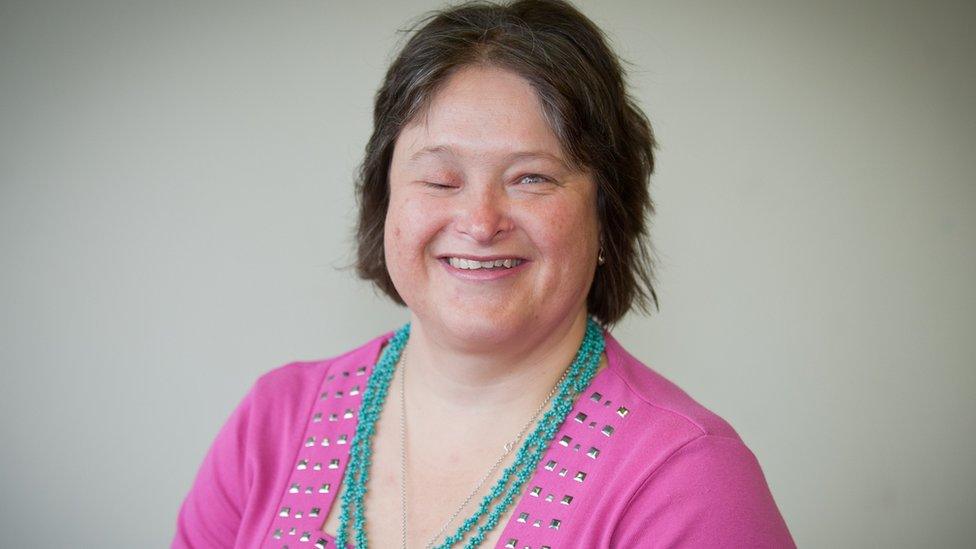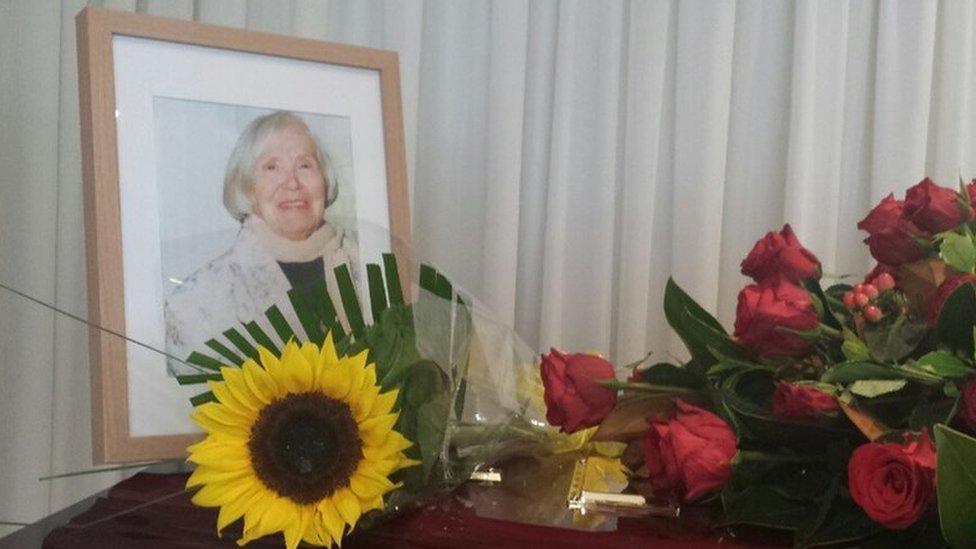Skyping at my grandmother's deathbed
- Published

What's it like to be at someone's deathbed - by Skype? Lee Kumutat, who's blind, discovered an unexpected comfort when she was faced with the death of a loved one half a world away.
My grandmother was dying. Her breath was becoming more and more laboured. I comforted Mum, as nurses came in regularly to check on them both, and say hello to me. We laughed and cried.
But I was not in the room. I was at home in London, 13,000 miles away from her care home in Sydney.
My grandmother was 94 when she died. She had dementia and my mother had been her sole carer for over 10 years. My family is of German background, so she was always "Oma" to us.
Oma's health deteriorated rapidly in those last weeks and she was taken to the respite home which, fortuitously, was equipped with fast and stable wifi. My mother and I had discovered this and we'd shared a number of virtual visits in the weeks before she died.

Find out more
Lee tells her story on BBC Radio 4's In Touch programme, which is broadcast on Tuesdays at 20:40 GMT - catch up on BBC iPlayer Radio

So, it seemed quite natural for Mum to Skype me when she learned that Oma's death was likely to happen in the next few hours. She asked me to stay and talk with her. From 13,000 miles away, I could hear the gentle hum of a well-run facility - people were respectfully getting on with their duties while somebody's well-lived life was coming to an end behind a curtain.
We talked about her, sharing memories of her quirks, how she'd driven us both crazy at times, and how she'd always been the same, never moody, never changing. I felt honoured when Mum asked me to write the eulogy for her funeral, although sadly distance and work would prevent me from attending.
Mum placed her tablet device on the bed next to Oma so she could hear me through its speaker. We told her it was OK, it was time for her to let go, and that we loved her.
I suggested that although I was on the line, Mum should call some other family members to be with her physically for when the moment came. She agreed.
I heard Oma's final breath and remember the music that was playing on the television of the person in the neighbouring bed. It was somebody singing James Taylor's Fire And Rain as performed on one of those talent shows.
It was an incredibly powerful and difficult moment.

Lee's grandmother - or "Oma"
I remained connected while phone calls and preparations were made, only hanging up when the family was ready to leave the hospital. As I tried to absorb the information that Oma was no longer part of my world, I became aware of a spreading sense of further poignancy.
Before I moved from Australia to England, I was witness to my mother's careful ministrations - she was efficient and practical - and I never felt like I was able to do any more than perhaps a 12-year-old child could - I might fetch a walking stick, or make a cup of tea here and there.
I would stand by while Mum washed and dressed Oma, only being able to offer an ear and the occasional bit of advice to Mum about how she could best look after herself during this difficult time. I know of many blind people who are carers for others who are ill or infirm, and that it's often my perception that sighted must equal faster and more efficient that can sometimes hold me back.
For the first time ever, I felt I'd been able to take part in events as much as possible considering there were two computers, thousands of miles of fibre-optics and a couple of satellites between us. And that maybe, for everybody involved, those limitations were easier to accept and deal with than those placed on me, and on others, by my blindness.
In similar situations in the past, I have sat by a bedside holding a hand and not heard a soft-footed nurse coming in to check observations and immediately felt I was in the way. Or I've found myself standing awkwardly in a cramped hospital room, too frightened to move in case I knocked out a vital line or set off an alarm. I was always wanting to help more, but I didn't know how to talk about it - because none of this was about me, and nor should it be.
And yet, from my room in north London, I had participated in a momentous and sad event within the heart of my family.
I couldn't get in the way, I couldn't offer a clumsy hug just as the person stepped away to shift a pillow. I had been useful and had contributed fully. Perhaps next time I am faced with a similar situation, I will better understand my limitations, accept them and feel sure that my individual contribution is important and appreciated.
For more Disability News, follow BBC Ouch on Twitter, external and Facebook, external, and subscribe to the weekly podcast.